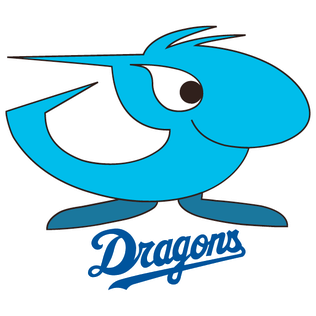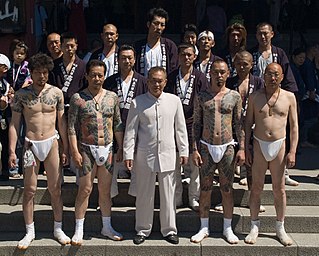
The Black Sox Scandal was a Major League Baseball match fixing incident in which eight members of the Chicago White Sox were accused of intentionally losing the 1919 World Series against the Cincinnati Reds in exchange for money from a gambling syndicate led by Arnold Rothstein. The fallout from the scandal resulted in the appointment of Judge Kenesaw Mountain Landis as the first Commissioner of Baseball, granting him absolute control over the sport in order to restore its integrity.
The Japan Championship Series, or Japan Series is the annual championship series in Nippon Professional Baseball, the top baseball league in Japan. It is a seven-game series between the winning clubs of the league's two circuits, the Central League and the Pacific League. The Series is the highest level of play in professional baseball in Japan. It is usually played in October or November. As in all of the best-of-seven series, the first team to win four games is the overall winner and is declared the Japan Series Champion each year. The winner of the Japan Series also goes on to be the Japanese representative team in the annual Asia Series.

The Chunichi Dragons are a professional baseball team based in Nagoya, the chief city in the Chūbu region of Japan. The team plays in the Central League of Nippon Professional Baseball. They have won the Central League pennant 9 times and the Japan Series twice in 1954 and 2007. They were also champions in the 2007 Asia Series.

The Saitama Seibu Lions are a professional baseball team in Japan's Pacific League based north of Tokyo in Tokorozawa, Saitama. Before 1979, they were based in Fukuoka in Kyushu. The team is owned by a subsidiary of Prince Hotels, which in turn is owned by the Seibu Group. The team experienced a recent period of financial difficulty, but the situation brightened when the team received a record ¥6 billion posting fee from the Boston Red Sox for the right to negotiate a contract with Daisuke Matsuzaka. Between 1978 and 2008, the team logo and mascot were based on the adult version of Kimba the White Lion, a classic Japanese anime series by Osamu Tezuka. In 2004, former Seibu Lions player Kazuo Matsui became the first Japanese infielder to play in Major League Baseball.
Princess Nine, or Princess Nine Kisaragi Girls High Baseball Club, is a 26-episode Japanese anime broadcast in Japan in 1998. The television series was produced by Phoenix Entertainment in Japan, initially released by ADV Films in North America, aired from April 8 to October 14, 1998 on NHK, ran for 26 episodes, and six volumes of the series were released on VHS and DVD. The show is listed at Animeondvd.com as a recommended series. At Anime Expo 2013, Right Stuf Inc. had announced that they have licensed the series for a 2014 release under their Lucky Penny label.

Fred Drury McMullin was an American Major League Baseball third baseman. He is best known for his involvement in the 1919 Black Sox scandal.

The Hokkaido Nippon-Ham Fighters are a Japanese professional baseball team based in Sapporo, Hokkaidō. They compete in the Pacific League of Nippon Professional Baseball, playing the majority of their home games at the Sapporo Dome. The Fighters also host a select number of regional home games in cities across Hokkaidō, including Hakodate, Asahikawa, Kushiro, and Obihiro. The team's name comes from its parent organization, Nippon Ham, a major Japanese food processing company.

James Alexander Devlin was an American Major League Baseball player who played mainly as a first baseman early in his career, then as a pitcher in the latter part. He played for three teams during his five-year career; the Philadelphia White Stockings and the Chicago White Stockings of the National Association, and the Louisville Grays of the National League. However, after admitting to throwing games and costing the Grays the pennant in the 1877 Louisville Grays scandal, he and three of his teammates were banished permanently from Major League Baseball.

The Chinese Professional Baseball League is the top-tier professional baseball league in Taiwan. The league was established in 1989. CPBL eventually absorbed the competing Taiwan Major League in 2003. As of the 2019 season, the CPBL consists of four teams.
There have been many dramatic on-and-off-field moments in over 130 years of Major League Baseball:
Osamu Higashio is a former Japanese baseball player who played in the Japanese professional leagues from 1969–1988. He also was manager of the Seibu Lions from 1995–2001.

William Joseph Maharg, also known as William Joseph Graham, was a professional boxer that has three distinct historical connections with Major League Baseball—first, as a replacement player in the 1912 Detroit Tigers' players strike; second, for a one-game stint with the Philadelphia Phillies in 1916, and third, for his role in the 1919 Chicago Black Sox Scandal.

George A. Bechtel was an American right fielder and pitcher in professional baseball's early history who became one of the leading players of his era. He played in all five seasons of baseball's first all-professional league, the National Association, and later played in the first season of baseball's first major league, the National League, when the Association folded. He later became the first player in Major League history to be suspended for life for intentionally losing games for money.

Hiroshi Ohshita, also spelled Oshita, was a Japanese Baseball Hall of Fame outfielder who began his career after World War II. Known for his trademark blue bat, he hit a record 20 home runs in a season and was home run king and leading hitter three times for the Toei Flyers. Ohshita was also a heavy hitter with the Nishitetsu Lions of the Pacific League during the 1950s.
Kentarō Ogawa was a Japanese professional baseball player. A right-handed submarine-style pitcher, he played in Japan for the Chunichi Dragons. Ogawa was one of the top pitchers in Nippon Professional Baseball before a scandal derailed his career. During his prime years from 1965–1969, Ogawa won 93 games, including winning 20 games or more twice.
The 1877 Louisville Grays scandal was an incident in which members of the Louisville Grays baseball team accepted money to lose games. Four players – Bill Craver, Jim Devlin, George Hall, and Al Nichols – were subsequently banned from professional baseball for life.













